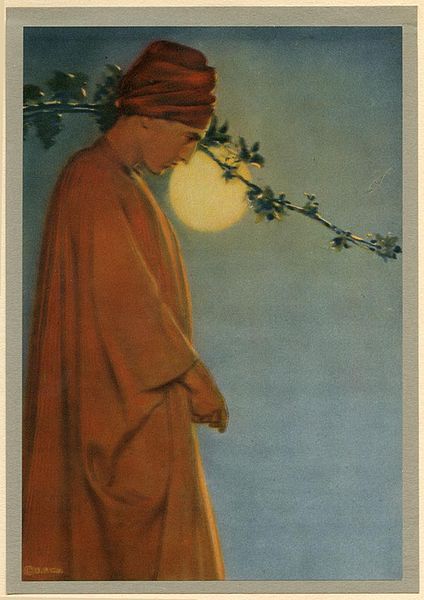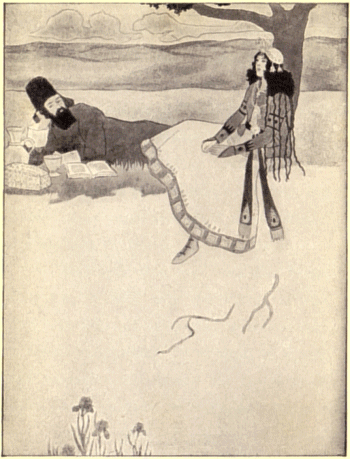We can’t lose an opportunity to wish Omar Khayyám a happy birthday, even though it’s already late afternoon in California. He was born in 1048 in Nayshapur, now in modern Iran. And fortunately, we have Don Share to remind us of the event over at his blog “Squanderman.”
As Don notes:
“A brilliant polymath, Khayyám was a mathematician, philosopher, astronomer, physician and poet. Most renowned during his lifetime as a mathematician, Khayyám wrote the influential Treatise on Demonstration of Problems of Algebra (1070), which, according to this Wikipedia entry, ‘laid down the principles of algebra, part of the body of Persian Mathematics that was eventually transmitted to Europe. In particular, he derived general methods for solving cubic equations and even some higher orders.’”
Mostly, however, Khayyám is remembered for his Rubáiyát, and in the English language, that means Edward FitzGerald‘s free translation:
Now the New Year reviving old Desires,
The thoughtful Soul to Solitude retires,
Where the White Hand Of Moses on the Bough
Puts out, and Jesus from the Ground suspires.
Iram indeed is gone with all his Rose,
And Jamshyd’s Sev’n-ring’d Cup where no one knows;
But still a Ruby kindles in the Vine,
And many a Garden by the Water blows …
Alright, alright … these are really really tired rhymes. But keep in mind that FitzGerald was writing in the late Victorian era, when nobody had gotten sick of them yet. To criticize today would be like getting grumpy at the words of Christmas carols. They have to be taken on their own terms.
According to Carol Rumens over at The Guardian:
The 101-verse semi-narrative FitzGerald finally assembled is the product of a ruthless editorial job – but how much poorer English poetry would be without it. His endeavour might more generously be termed “transcreation”. Khayyám, an agnostic famed during his lifetime as a mathematician and astronomer rather than a poet, and his mediator, a nineteenth-century English sceptic who believed that “science unrolls a greater epic than the Iliad”, may not meet in a true linguistic union, but there seems to be a “marriage of true minds” nevertheless (and, yes, you’ll note a passing trace of Shakespeare in FitzGerald’s diction).
The speaker that emerges with such authority and panache, despite the stiffish western dress of iambic pentameter, has a voice unlike any other in Victorian poetry, and a philosophical sensibility which, while it has been compared to that of Epicurus and Lucretius, is new and distinct. A whole culture must have suddenly seemed within the imaginative reach of the poem’s first audience.
“Stiffish western dress of iambic pentameter”? Who sez? We must also respectfully disagree with the wise Don Share when he refers to the “jiggered” verse of FitzGerald. We’ll grant him the use of that word in the sense of “exhausted” or “shopworn.” Khayyám’s verses had been quoted by cheesy wannabe seducers until the maidens began laughing them out of the room. But FitzGerald’s verses would not have become clichés if they had not been so good in the first place. Would we even talk about Khayyám today if it were not for FitzGerald’s verses?
Khayyám is remembered in other ways, as Journalist Kourosh Ziabari reminds us:
Tunisia has constructed a set of hotels named after Khayyam. One of the lunar craters has been named in honor of Omar Khayyám. The Omar Khayyám crater is located at 58.0N latitude and 102.1W longitude on the surface of moon. The Outer Main-belt Asteroid 1980 RT2 is also named in honor of Omar Khayyam. The Argentine Marxist revolutionary and guerrilla leader Che Guevara named his son Omar in honor of Khayyám and his work. Omar Pérez López is a Cuban writer and poet.
The American clergyman and activist Martin Luther King Jr. quoted Khayyám in his speech Why I oppose war in Vietnam: “It is time for all people of conscience to call upon America to come back home. Come home America. Omar Khayyam is right ‘The moving finger writes and having writ, moves on.”
The late American novelist Kurt Vonnegut refers to Khayyám’s “moving finger writes” quatrain in his novel Breakfast of Champions when the protagonist Dwayne Hoover reveals that he had been forced to memorize it in high school.
Don Share reminds us that poet Basil Bunting also was a fan:
A letter from Bunting to Louis Zukofsky (30 August 1933) included a transliterated and untranslated version of a rubai by Omar Khayyám – may their correspondence someday be published! – and in his introduction to Omar Pound’s Arabic & Persian Poems in English, Bunting wrote:
“Persian poetry has suffered badly, Arabic rather less, from neoplatonic dons determined to find an arbitrary mysticism in everything. You would think there was nothing else in Moslem [sic] poetry than nightingales which are not birds, roses which are not flowers, and pretty boys who are God in disguise. An anthology of English verse selected exclusively from George Herbert, Charles Wesley, and Father Hopkins, plus ‘Lead, kindly light’ and ‘The Hound of Heaven,’ would be as representative as the usual samples of Persian poetry. FitzGerald’s Khayyám is the only serious exception.”
The big problem, Persian scholars tell me, is that it’s not really Khayyám. For that you must look elsewhere. Or you might simply f0llow Don’s suggestion and try his two favorite editions of FitzGerald’s adaptation: the one by Daniel Karlin in the Oxford World Classics, and the critical edition by Christopher Decker.
But meanwhile, check out Don’s post here. He’s promising to lift a glass for old Khayyám tonight … and a second for Basil Bunting.
 Postscript from Jeff Sypeck over at Quid Plura?, the day after Omar Khayyám’s birthday: FitzGerald’s translation has its stuffy moments, but its influence and ubiquity are remarkable–and so is the speed with which our culture has lost its knowledge of English-language poetry. I recall a “Garfield” comic strip (of all things) from the early 1980s that included the line, “A jug of wine, a loaf of bread, and thou.” I can’t imagine anyone hoping that a few young readers might catch the reference today.
Postscript from Jeff Sypeck over at Quid Plura?, the day after Omar Khayyám’s birthday: FitzGerald’s translation has its stuffy moments, but its influence and ubiquity are remarkable–and so is the speed with which our culture has lost its knowledge of English-language poetry. I recall a “Garfield” comic strip (of all things) from the early 1980s that included the line, “A jug of wine, a loaf of bread, and thou.” I can’t imagine anyone hoping that a few young readers might catch the reference today.
Tags: Basil Bunting, Don Share, Edward FitzGerald, Omar Khayyam



May 19th, 2013 at 3:04 pm
FitzGerald’s translation has its stuffy moments, but its influence and ubiquity are remarkable–and so is the speed with which our culture has lost its knowledge of English-language poetry. I recall a “Garfield” comic strip (of all things) from the early 1980s that included the line, “A jug of wine, a loaf of bread, and thou.” I can’t imagine anyone hoping that a few young readers might catch the reference today.
May 19th, 2013 at 7:01 pm
Sad, but true.
May 20th, 2013 at 9:03 am
And I have a vague memory of – was it? – Tony Curtis in a Hollywood Arabian epic, cantering across the desert, beautiful woman on his saddle bow. He looks down at her, “A jug of wine … “. She responds, “Oh Omar, you are a wonderful poet.”
Stupendous.
May 21st, 2013 at 9:48 am
Here is what Vachel Lindsay was affirming on “reading omar khayyam” In the midst of the battle I turned, (For the thunders could flourish without me) And hid by a rose-hung wall, Forgetting the murder about me; And wrote, from my wound, on the stone, In mirth, half prayer, half play: — “Send me a picture book, Send me a song, to-day.” I saw him there by the wall… So thank to Don Share for this reminder